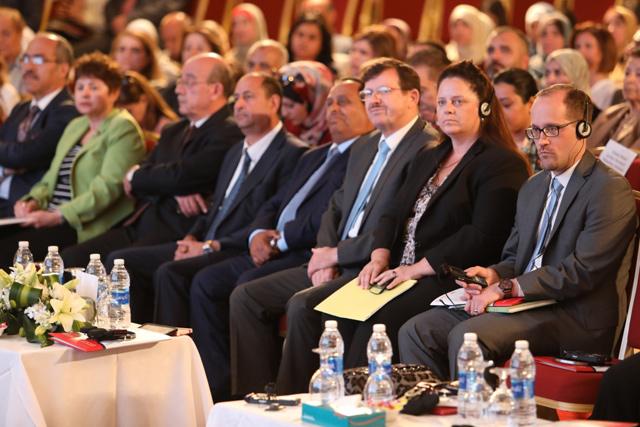You are here
USAID programme empowers women in health sector
By Ana V. Ibáñez Prieto - Jun 26,2018 - Last updated at Jun 26,2018

Stakeholders attend a meeting organised by USAID’s Human Resources for Health 2030 in Amman on Monday (Photo courtesy of Bidaya corp.)
AMMAN — “Over the past years, the Ministry of Health has witnessed rapid developments in the empowerment of women,” Health Minister Mahmoud Sheyyab said on Monday, stressing that “the ministry is constantly working towards the inclusion of women in leadership and management roles and their engagement with the health sector.”
His remarks came during a meeting held by USAID’s Human Resources for Health 2030 (HRH2030), where stakeholders discussed the results of the organisation’s research on the barriers and enablers of women's career progression to management position in Jordan’s health sector.
Running for five years, the global HRH2030 programme strives to “build the accessible, available, acceptable and high quality health workforce needed to improve health outcomes and advance universal health coverage,” according to its organisers.
Held under the patronage of HRH Princess Muna, the event aimed at presenting success stories on women’s empowerment in leadership and health, advocating for interventions to support women's management and discussing ways to implement the research recommendations.
“The ministry has been actively seeking to strengthen the leadership role of women, with 29 per cent of senior management and 27 per cent of manager positions being held by women, and 40 per cent as head of division,” Sheyyab pointed out, adding “in terms of the distribution of staff, the proportion of women increased from 53 per cent in 2015 to 56 per cent in 2018.”
For her part, USAID acting mission director Nancy Eslick noted: “Investing in a highly skilled workforce that includes women in leadership positions will strengthen the health system and improve health outcomes, a cornerstone of Jordan’s continued economic growth, security and stability.”
“Women account for about half of the health workforce in Jordan, yet they are underrepresented in top management roles,” she added, elaborating on the findings of the study.
The research included samples from a variety of health institutions including the Ministry of Health, the private sector and university hospitals, in addition to a range of health professionals such as physicians, nurses and pharmacists.
According to the study, almost 90 per cent of women and more than 90 per cent of men agreed that people should be rewarded based on performance, regardless of whether they are men or women.
In addition, more than 70 per cent of women reported that they have the skills and abilities for career advancement and believe that they deserve to be promoted to a higher management position.
Concerning the study recommendations, the chairperson of the HRH2030 Advisory Committee Rowaida Maaitah, highlighted the need to “create evidence on the economic and social impact of the women workforce towards an evidence-based policy dialogue.”
In addition, Eslick recommended an increase in the number of women in senior roles and their influence in decision making, calling for “extended efforts to support women at every level to develop their leadership and quality improvement skills”.
Related Articles
AMMAN — The Jordan Labour Watch, an affiliate of the Phenix Centre for Economic and Informatics Studies, on Tuesday called for the improveme
AMMAN — The Public Works Ministry and the the United States Agency for International Development (USAID) on Wednesday signed various agreeme
When Ajloun resident Wijdan Rabadi decided to study electrical engineering in the early 1980s, the decision was met with rejection from her community.











